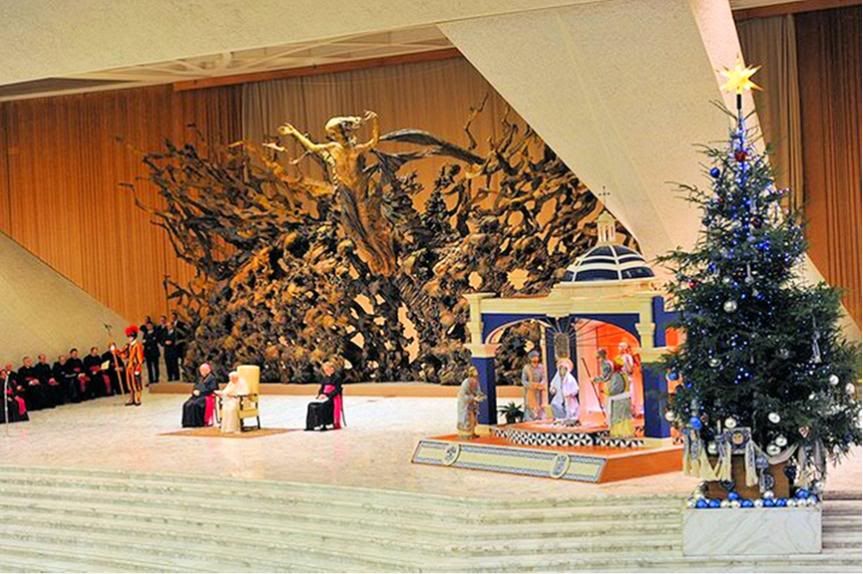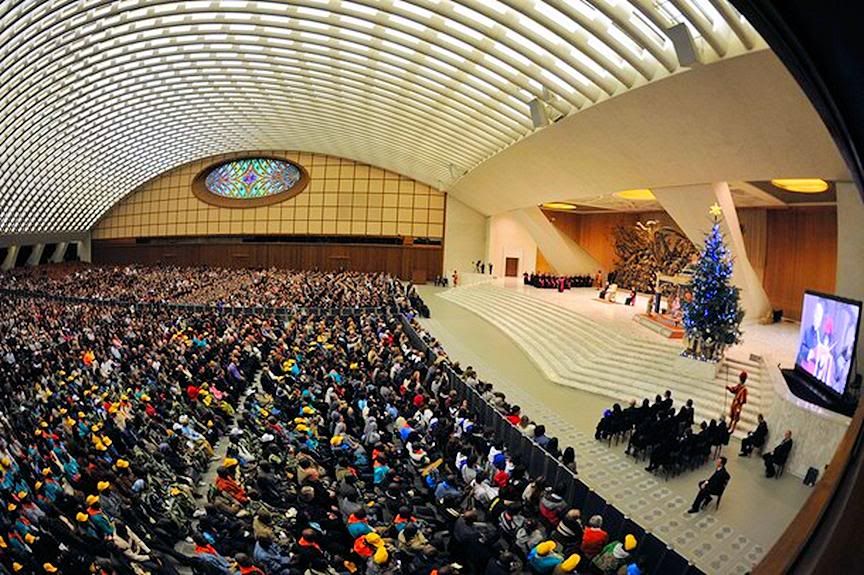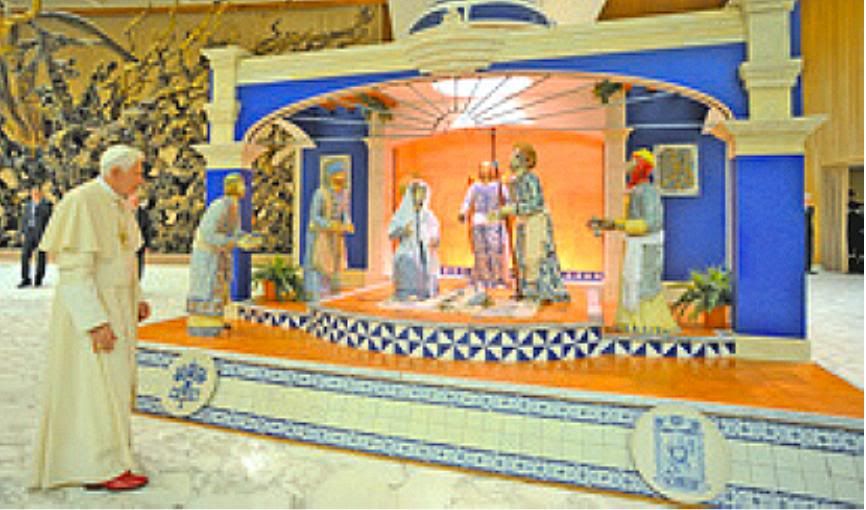| | | OFFLINE | | Post: 23.944
Post: 6.514 | Registrato il: 28/08/2005
Registrato il: 20/01/2009 | Administratore | Utente Master | |
|
 Pope Benedict: 'We must trust
Pope Benedict: 'We must trust
God’s answers to our prayers'

December 14, 2011

"When we pray we must not expect the immediate fulfillment of our petitions, of our will" but instead, must accept the will of God, who "is the God of life, who brings hope, capable of reversing humanly impossible situations", said Pope Benedict XVI Wednesday as he delivered the latest in his series of catecheses on prayer in the Paul VI Hall.
Continuing his focus on Christ’s own prayer, with special attention to the context of his miracles of healing, Pope Benedict said:
Both the cure of the deaf-mute man (Mk 7:32-37) and the raising of Lazarus (Jn 11:1-44) show us Jesus at prayer before cases of human suffering.
His prayer on these occasions reveals not only his profound identification with the suffering but also his unique relationship with the Father. In the case of the deaf-mute man, Jesus’s compassion leads him to introduce his prayer with a deep sigh (v. 34). In the case of Lazarus, he is deeply moved by the sorrow of Martha and Mary, and weeps before the tomb of his friend.
Pope Benedict went on to say that, at the same time, Christ saw the tragedy of Lazarus’s death in the light of the Father’s will and of his own identity and mission.
Jesus’s example teaches us that in our own prayers we must always trust in the Father’s will and strive to see all things in the light of his mysterious plan of love. We too must join petition, praise and thanksgiving in every prayer, knowing that the greatest gift God can give us is his friendship, and that our example of prayer can open our hearts to our brothers and sisters in need and point others to God’s saving presence in our world.
The Holy Father had this greeting for English-speaking pilgrims:
I offer a warm welcome to all the English-speaking visitors present, including the groups from Vietnam, Nigeria and the United States. As we prepare to celebrate the Saviour’s birth at Christmas, I cordially invoke upon you and your families his abundant blessings of joy and peace!
This Wednesday’s catechesis was the latest in a series of catechetical reflections on prayer which began in May this year.
 Here is a translation of the catechesis
Here is a translation of the catechesis:
Dear brothers and sisters:
Today I wish to reflect with you on the prayer of Jesus linked to his wondrous healing actions. The Gospels present various situations in which Jesus's prayer precedes the beneficial and healing work of God the Father acting through him.
It is the kind of prayer that once again manifests his unique relationship of knowledge and communion with the Father, even as Jesus allows himself to be involved, with great human participation ,in the distress of his friends - for example, of Lazarus and his family, and of the so many poor and ailing persons whom he wished to aid concretely.
A significant case was the healing of the deafmute (cfr Mk 7,32-37). The account of the evangelist Mark which we just heard shows that Jesus's healing action was linked to an intense relationship with his neighbor - in this case, the handicapped man - as he did with his Father.
The scene of the miracle is carefully described as follows: "He took him off by himself away from the crowd. He put his finger into the man’s ears and, spitting, touched his tongue; then he looked up to heaven and groaned, and said to him, 'Ephphatha!' (that is, 'Be opened!')" (7,33-34).
Jesus wanted the healing to take place 'away from the crowd - it would seem, not only to keep the miracle hidden from the people to keep them from making restrictive and distorting interpretations of Jesus himself.
His choice to take the ailing man apart meant that at the moment of healing, Jesus and the deafmute were by themselves, brought together by a singular relationship. With one gesture, the Lord touches the ears and tongue of the man - the places where the man is infirm.
The intensity of Jesus's attention is manifested even in the unusual features of the healing: He uses his own fingers and even his own saliva. And even the fact that the evangelist reports the original word pronounced by the Lord, "Effata", or 'Open up' - proves the singular nature of the scene.
But the central point of this episode is the fact that Jesus, at the moment of working the healing, directly seeks his relationship with the Father. Indeed, the account says that "he looked up to heaven and groaned" (v 34).
His attention to the sick man, Jesus's concern for him, are linked to his profound attitude of prayer towards God. And his 'groan' is described by a verb that in the New Testament means aspirating something good that one does not yet have (cf Rm 8, 33).
The entire account, then, shows that his human involvement with the disabled man bring Jesus to prayer. Once more his unique relationship with the Father emerges, his identity as the only-begotten Son.
In him, through his person, God's beneficial and healing action is manifested. It's not by chance that the immediate reaction of the people after the miracle recalls the assessment of Creation at the start of Genesis: "He has done all things well..." (Mk 7, 23).
Prayer enters clearly in Jesus's healing action, when he looks up to heaven. The power which healed the deafmute was surely provoked by his compassion for him. but it came from his recourse to the Father. Two relationships meet here: the human relationship of compassion with man, which enters into the relationship with God, and this becomes healing.
In the Johannine account of the resurrection of Lazarus, this same dynamic is proven even more obviously (cfr Jn 11,1-44). Here, too, are interwoven, on the one hand, Jesus's ties to a friend and with his suffering, and on the other, his filial relationship with the Father.
Jesus's human participation in the case of Lazarus has special features. The entire account repeatedly recalls their friendship, as well as Jesus's friendship with Lazarus's sisters Martha and Mary,
Jesus himself says: "“Our friend Lazarus is asleep, but I am going to awaken him" (Jn 11,11). His sincere affection for his friend is evidenced also by the sisters of Lazarus, as well as by the Jews (cf Jn 11,3; 11,36). It is manifested in Jesus's emotion upon seeing the grief of Martha and Mary and all of Lazarus's friends, leading him to weep - something so profoundly human - as he approaches the tomb:
"When Jesus saw her weeping and the Jews who had come with her weeping, he became perturbed and deeply troubled, and said, 'Where have you laid him?' They said to him, 'Sir, come and see.' And Jesus wept" ![[SM=g7969]](https://im0.freeforumzone.it/up/0/69/3179631.gif) (Jn 11,33-35). (Jn 11,33-35).
This bond of friendship, the participation and emotion of Jesus in the face of the grief of Lazarus's family and acquaintances, is linked in the whole account with a continuous and intense contact with the Father.
From the beginning, the event is read by Jesus in the light of his own identity and mission, and of the glory that awaits him. Indeed, upon getting the news that Lazarus was ill, he comments: “This illness is not to end in death, but is for the glory of God, that the Son of God may be glorified through it (Jn 11,4).
The announcement of the death of his friend was subsequently received by Jesus with profound human grief, but always in clear relation to his relationship with God and the mission entrusted to him, saying: “Lazarus has died. And I am glad for you that I was not there, that you may believe” (Jn 11, 14-15).
The moment of Jesus's explicit prayer to the Father in front of the tomb is the natural outcome of the whole episode, which has played on the double register of his friendship with Lazarus and his filial relationship to God.
Here, too, the two relationships go hand in hand. "Jesus raised his eyes and said, 'Father,' I thank you for hearing me" (Jn 11,41): It is a Eucharist. The statement reveals that Jesus had not ceased one moment to pray for the life of Lazarus. This continuous prayer strengthened his bond with his friend and at the same time, it confirmed Jesus's decision to remain in communion with the will of God, with his plan of love, in which the sickness and the death of Lazarus must be considered as an occasion when God's glory is manifested.
Dear brothers and sisters, reading this narrative, each of us is called on to understand that when we pray to ask the Lord for something, we must not expect an immediate fulfillment of what we ask for., of our will, but rather trust in the will of the Father, reading every event in the perspective of his glory, of his plan of love, often mysterious to our eyes.
That is why, in our prayers, petition, praise and thanksgiving must merge. even when it seems that God is not responding to our concrete expectations. Abandoning ourselves to the love of God, which always precedes and accompanies us, is one of the fundamental attitudes in our dialog with him.
The Catechism of the Catholic Church says this of the prayer of Jesus in the account of the resurrection of Lazarus: "Thanksgiving precedes the event: 'Father, I thank you for having heard me', which implies that the Father always hears his petitions. Jesus immediately adds: 'I know that you always hear me', which implies that Jesus, on his part, constantly made such petitions.
Jesus's prayer, characterized by thanksgiving, reveals to us how to ask: before the gift is given, Jesus commits himself to the One who in giving gives himself. The Giver is more precious than the gift; he is the 'treasure'; in him abides his Son's heart; the gift is given 'as well' (cfr Mt 6,21 e 6,33)» (2604).
This is very important: before the gift is given, to adhere to him who gives: the giver is more precious than the gift. Even for us, therefore, beyond what God gives us when we invoke him, the greatest gift he can give us is his friendship, his presence, his love. He is the precious treasure to seek and to safeguard always.
The prayer that Jesus says while the stone to the entrance of Lazarus's tomb is being removed then presents a singular and unexpected development. Indeed, after he has thanked the Father, he adds: "I know that you always hear me; but because of the crowd here I have said this, that they may believe that you sent me" (Jn 11,42).
With his prayer, Jesus wishes to lead to faith, to total trust in God and his will, and he wants to show that this God who so loved man and the world to send his only begotten-Son (cfr Jn 3,16), is the God of life, the God who brings hope and who can reverse any situation that is humanly impossible.
The trustful prayer of a believer, therefore, is a living testimonial to this presence of God in the world, of his interest in man, of his acting to realize his plan of salvation.
The two prayers of Jesus that we have reflected on, that accompanied the healing of the deafmute and the resurrection of Lazarus, reveal that the profound link between the love of God and love for our neighbor must enter into our prayer.
In Jesus, true God and true man, attention to others, especially those who are needy and suffering, his compassion in the face of the grief of his friend's family, make him address the Father, in that fundamental relationship that guided his whole life.
But the reverse is also true. Communion with the father, the constant dialog with him, impels Jesus to be uniquely attentive to concrete human situations in order to bring man the comfort and the love of God. Relationship with man leads to a relationship with God, and that with God leads us back to our neighbor.
Dear brothers and sisters, our prayer opens the door to God, who teaches us to constantly leave ourselves in order to be able to make ourselves close to others, especially in their moments of trial, to bring them comfort, hope and love.
May the Lord grant that we may be capable of prayer that is ever more intense in order to reinforce our personal relationship with God the Father, open up our heart to the needs of those around us, and feel the beauty of being "children in the Son" together with all our brothers. Thank you.
 The Holy Father before the Nativity scene set up in Aula Paolo VI by the Mexican state of Puebla with hand-carved wooden statues.
The Holy Father before the Nativity scene set up in Aula Paolo VI by the Mexican state of Puebla with hand-carved wooden statues.
[Modificato da TERESA BENEDETTA 16/12/2011 00:50] |